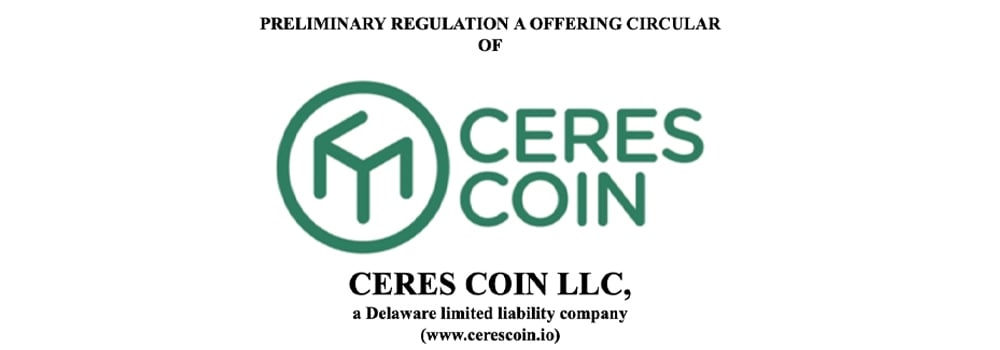Chicago-based lending firm Ceres recently filed for a request to conduct a Reg. A sale in order to get approval from the U.S. Securities and Exchange Commission (SEC). Ceres wants to launch a token that will be used for garnering equity, while the company also wants to launch a coin that can be used to lend to cannabis startups in need of funding.
Cryptocurrencies and cannabis culture go hand in hand in the eyes of many, and the company Ceres seems to be a firm believer of this theory. On June 30, 2020, filed paperwork from the company, Ceres Coin LLC to the U.S. Securities and Exchange Commission (SEC), shows the firm wants to conduct a Reg. A offering. Basically, a Regulation A offering is an exemption from the traditional registration requirements. It means that after the SEC approves the filing, Ceres can immediately accept payment for the token sales.

Essentially, Ceres’s business plan is to become a decentralized lending service for legal cannabis companies. Ceres will leverage two coins in order to harness equity and a coin that allows cannabis businesses to benefit from the funding. One coin will be a U.S. dollar-backed stablecoin, similar to the likes of tether (USDT). Ceres has asked the SEC to raise “up to $20,000,000 worth of its ‘coins’ and up to $30,000,000 worth of its ‘tokens.’”
The filing notes that token holders who obtain the equity version will be entitled to 80% of Ceres’s net revenues stemming from loans and 20% from the blockchain infrastructure. The filing also stresses that “payments for purchased tokens may be made in U.S. Dollars only.”
“It should also be noted that it is intended that the offer and sale of the coins will be deemed a “continuous offering” within the meaning of 17 CFR 230.251(d)(3) and that the offering of the coins will remain open for more than one (1) year,” the filing highlights in bold lettering.
The company also has a website called cerescoin.io and it gives a comprehensive description of what Ceres aims to accomplish. Ceres will follow the other regulated token offerings that were recently approved by the SEC. On July 10-11, 2019, two Reg. A token sales were approved by the SEC making history as the first two approvals.
At the time, the SEC approved Blockstack PBC and the Props Project. Ceres stresses that the Reg. A filing approach is a more sustainable method than leveraging the unregulated initial coin offering (ICO) method.
“In 2017, at the peak of the ICO craze, the team at Ceres realized that SEC regulation had to enter the picture for cryptocurrencies to be sustainable,” the company website notes. “Taking the initiative to do the harder right thing over the easier wrong thing, Ceres opted to avoid the ICO mania and engage directly with the SEC to provide a qualified cryptocurrency offering for the cannabis market.”
Ceres claims that the blockchain network, if approved by the SEC, will help bolster the cannabis industry, as far as regulatory guidelines and financial transparency is concerned. Ceres noted that the company plans to focus on the state of Washington and Illinois. The Chicago-based lending firm has already started working in Washington State when it invoked a beta test in the region.
“[During the fourth quarter of 2018, Ceres engaged] with the top producer/processors and dispensaries in Washington St., [as] Ceres plans to launch a beta test proving the capabilities of Ceres as a transactional coin through the cannabis ecosystem,” the firm notes on the company web portal.
What do you think about Ceres applying for a Reg. A sale with the SEC to sell two types of crypto coins? Let us know what you think about this subject in the comments section below.
Image Credits: Shutterstock, Pixabay, Wiki Commons, sec.gov/Archives
Disclaimer: This article is for informational purposes only. It is not a direct offer or solicitation of an offer to buy or sell, or a recommendation or endorsement of any products, services, or companies. Bitcoin.com does not provide investment, tax, legal, or accounting advice. Neither the company nor the author is responsible, directly or indirectly, for any damage or loss caused or alleged to be caused by or in connection with the use of or reliance on any content, goods or services mentioned in this article.



